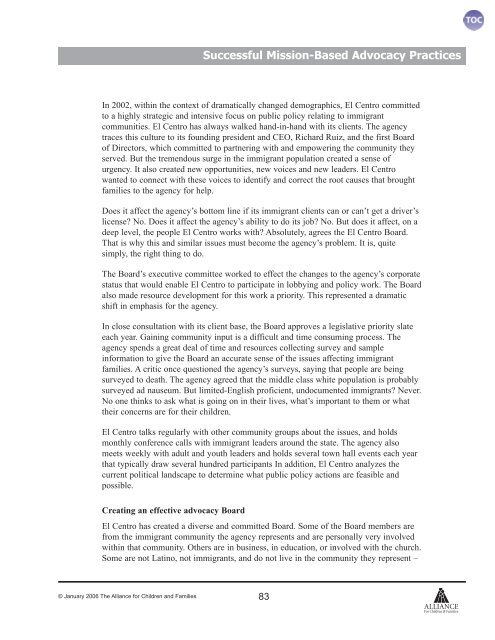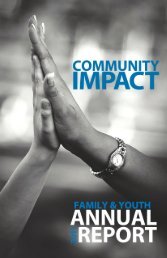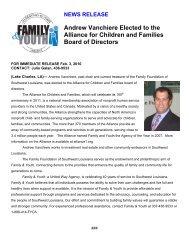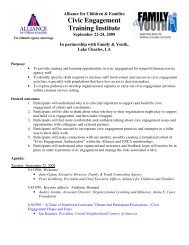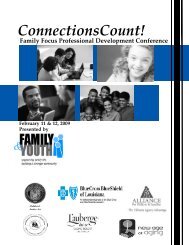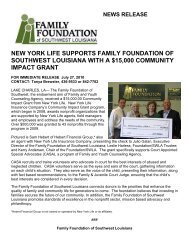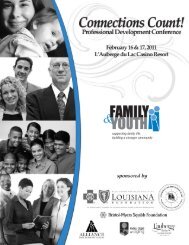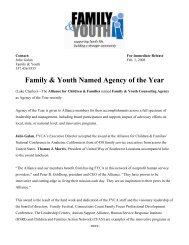Mission-based Advocacy Toolkit from Alliance for Children & Families
Mission-based Advocacy Toolkit from Alliance for Children & Families
Mission-based Advocacy Toolkit from Alliance for Children & Families
Create successful ePaper yourself
Turn your PDF publications into a flip-book with our unique Google optimized e-Paper software.
In 2002, within the context of dramatically changed demographics, El Centro committed<br />
to a highly strategic and intensive focus on public policy relating to immigrant<br />
communities. El Centro has always walked hand-in-hand with its clients. The agency<br />
traces this culture to its founding president and CEO, Richard Ruiz, and the first Board<br />
of Directors, which committed to partnering with and empowering the community they<br />
served. But the tremendous surge in the immigrant population created a sense of<br />
urgency. It also created new opportunities, new voices and new leaders. El Centro<br />
wanted to connect with these voices to identify and correct the root causes that brought<br />
families to the agency <strong>for</strong> help.<br />
Does it affect the agency’s bottom line if its immigrant clients can or can’t get a driver’s<br />
license? No. Does it affect the agency’s ability to do its job? No. But does it affect, on a<br />
deep level, the people El Centro works with? Absolutely, agrees the El Centro Board.<br />
That is why this and similar issues must become the agency’s problem. It is, quite<br />
simply, the right thing to do.<br />
The Board’s executive committee worked to effect the changes to the agency’s corporate<br />
status that would enable El Centro to participate in lobbying and policy work. The Board<br />
also made resource development <strong>for</strong> this work a priority. This represented a dramatic<br />
shift in emphasis <strong>for</strong> the agency.<br />
In close consultation with its client base, the Board approves a legislative priority slate<br />
each year. Gaining community input is a difficult and time consuming process. The<br />
agency spends a great deal of time and resources collecting survey and sample<br />
in<strong>for</strong>mation to give the Board an accurate sense of the issues affecting immigrant<br />
families. A critic once questioned the agency’s surveys, saying that people are being<br />
surveyed to death. The agency agreed that the middle class white population is probably<br />
surveyed ad nauseum. But limited-English proficient, undocumented immigrants? Never.<br />
No one thinks to ask what is going on in their lives, what’s important to them or what<br />
their concerns are <strong>for</strong> their children.<br />
El Centro talks regularly with other community groups about the issues, and holds<br />
monthly conference calls with immigrant leaders around the state. The agency also<br />
meets weekly with adult and youth leaders and holds several town hall events each year<br />
that typically draw several hundred participants In addition, El Centro analyzes the<br />
current political landscape to determine what public policy actions are feasible and<br />
possible.<br />
Creating an effective advocacy Board<br />
El Centro has created a diverse and committed Board. Some of the Board members are<br />
<strong>from</strong> the immigrant community the agency represents and are personally very involved<br />
within that community. Others are in business, in education, or involved with the church.<br />
Some are not Latino, not immigrants, and do not live in the community they represent –<br />
© January 2006 The <strong>Alliance</strong> <strong>for</strong> <strong>Children</strong> and <strong>Families</strong> 83<br />
Successful <strong>Mission</strong>-Based <strong>Advocacy</strong> Practices


